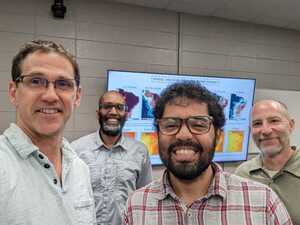 Victor had a great defense and has now earned his MSc from UGA! Congratulations Victor! "Applied Geospatial Data Science for and Integrative Analysis of the Climate of Northeast Brazil". He is heading back to his native Cairiri - we will miss you Victor.
0 Comments
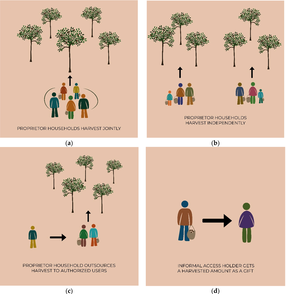 HECLab member Bruno Ubiali recently published work from his MA research in a special issue of Land. The study analyzes traditional population livelihoods in the Amazon and explores the complexities between differential access to forest resources and the livelihood strategies designed by smallholders. It also engages in debates around the relationship between extractivism, forest conservation, social and economic development, agriculture and cattle raising. The article can be found here. 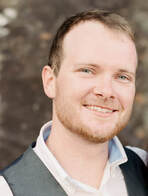 Congratulations to John as a newly minted PhD! John successfully defended his dissertation "When the rain falls: Adaptation to compound disasters and climate unpredictability in natural resource dependent communities of rural Haiti". John now resides in Ft. Collins, CO with his growing family and works as the Socioeconomic Monitoring Coordinator for the U.S. National Park Service. Have fun teaching your kids whitewater rafting - we will miss you at the HECLab!  Congratulations, Kaila, on your recently published manuscript "Trauma ≠ Identity"! You can read Kaila's piece in UGA's The Classic Journal 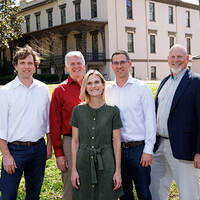 Don and five collaborators were awarded the UGA Team Impact Award from the Office of the Vice President for Research. Description of the team's work can be found here. "The Team Impact Award recognizes the critical contributions made by crosscutting teams in addressing today’s complex challenges. Specifically, the award recognizes a team for excellence in innovative and impactful scholarship that either has or soon promises to fundamentally advance knowledge, understanding and/or applications in ways not achievable by individual investigators or single disciplinary approaches alone" 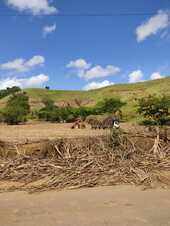 As one of the finalists for the Anthropology and Environment Society's Roy Rappaport Prize, Shelly was invited to write a blog post about her research for the society's blog page. Congratulations! You can read it here. Photo by Shelly. 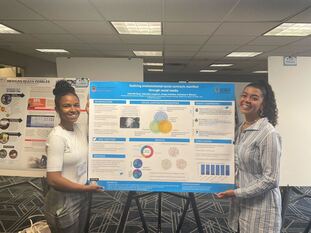 Kaila, Gabrielle (both pictured) and Amaja won the Society for Applied Anthropology's Best Student poster award for their entry "Evolving Environmental Social Contracts Manifest Through Social Media". Congratulations, and thank you Andressa for all your contributions. Poster can be seen here. Bruno Ubiali is a 2022 Halperin Memorial Fund recipient from the Society for Economic Anthropology for his proposed research "Present but Invisible: Revealing Perceptions of Forest Products in the Eastern Amazon". The award will pay for predissertation research and for him to present his work at the 2023 SEA conference.
Abstract: The ongoing expansion of government-sponsored logging and cattle ranching in the Brazilian Amazon collides with Indigenous communities that pursue forest-based livelihoods. This predissertation research aims at understanding Indigenous and large-scale farmers’ cultural notions of land, which will contribute to revealing the cultural and social values of forest-based livelihoods and industrial agriculture in the Amazon and elsewhere. I will undertake this predissertation research in Santarém, Brazil, where Indigenous livelihoods and corporate interests currently are – and have historically been – in stark contrast. I will meet academic partners, establish relationships with communities, and collect data that will inform my dissertation research design. 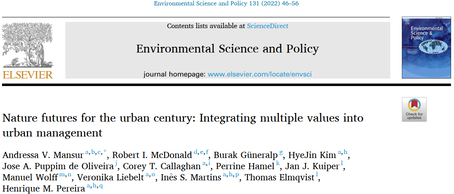 How to discuss desirable scenarios for cities using alternative visions and scenario framework for management of nature in cities? Recognizing multiple values for our relationship with nature in urban settings can help to co-design greener and more sustainable urban futures. This is recent effort led by Andressa Mansur as a result of a collaborative workshop with colleagues from IPBES Scenarios and Models assessment, The Nature Conservancy and urban ecology experts. The publication offers a framework for creating alternative visions for nature in cities through four components, including the leverage points for reinforcing social-ecological feedbacks that draw on co-benefits from multiple nature perspectives, assessment of indirect impacts of cities on biodiversity, development of multi-scale monitoring and development of scenarios for nature in cities. The publication can be found here. |
HECLAB newsLearn about what we have been up to. Archives
February 2024
CategoriEs
All
|
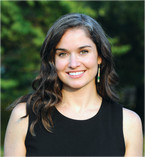
 RSS Feed
RSS Feed